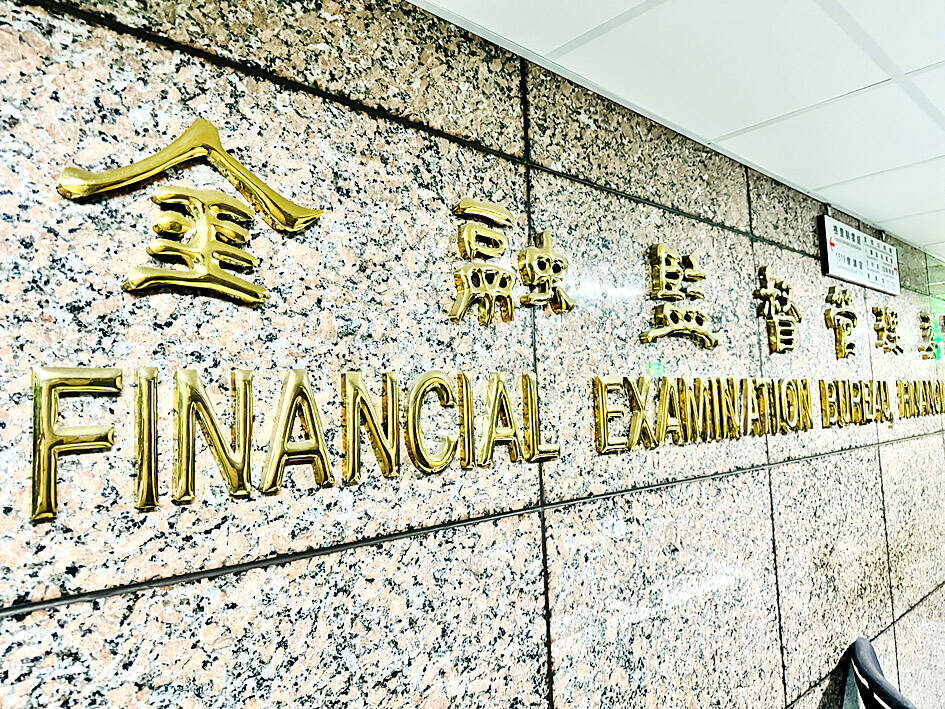Taiwan’s financial regulator is reviewing some of its rules and practices amid criticism from local banks and insurers on the inconsistency and over-complication of its governance, sources familiar with the matter said.
The Financial Supervisory Commission (FSC) has agreed to adopt more consistent standards during on-site inspections, and pledged to amend rules and regulations to correct any missteps, said the sources, who participated in a private meeting earlier this month.
Local financial institutions, in particular life insurance companies, have complained about the layers of bureaucracy and outdated governance system that have led to inconsistencies in enforcement, contradictory orders, and delays of business activities, the sources added.

Photo: Kelson Wang, Taipei Times
The Financial Examination Bureau would continue to take industry suggestions into account to further improve the inspection process, Financial Examination Bureau Deputy Director-General Chang Tzy-ming (張子敏) said.
The bureau released relevant principles three years ago, he added.
The issue is becoming more urgent as Taiwan is seeking to diversify its economy and become a center for asset management. Foreign money managers are increasingly interested in the market, bringing regulation issues to the fore.
While the changes would only take place after the FSC grants a formal approval by the end of this year, officials attending the meeting earlier this month have agreed to amend regulations, the sources said.
The FSC set up a task force in August to facilitate communications with the financial industry and academia. The watchdog said it would solicit suggestions from all parties, and adjust legislation and supervisory actions to enhance the competitiveness of the industry.
Taiwan’s life insurers hold more than US$1 trillion of assets, but 80 percent is invested abroad due to lack of products at home. This has left the industry struggling with high hedging costs and a mismatch in liabilities and assets, which have led to foreign exchange losses over the past few years.
In addition to regulatory improvement, the government has also stepped up efforts to roll out more products and deepen the market opening, including allowing the issuance of active exchange-traded funds (ETFs), opening up the purchase of foreign virtual asset ETFs to professional investors and increasing the number of stocks with overnight futures trading.

Nvidia Corp chief executive officer Jensen Huang (黃仁勳) on Monday introduced the company’s latest supercomputer platform, featuring six new chips made by Taiwan Semiconductor Manufacturing Co (TSMC, 台積電), saying that it is now “in full production.” “If Vera Rubin is going to be in time for this year, it must be in production by now, and so, today I can tell you that Vera Rubin is in full production,” Huang said during his keynote speech at CES in Las Vegas. The rollout of six concurrent chips for Vera Rubin — the company’s next-generation artificial intelligence (AI) computing platform — marks a strategic

Shares in Taiwan closed at a new high yesterday, the first trading day of the new year, as contract chipmaker Taiwan Semiconductor Manufacturing Co (TSMC, 台積電) continued to break records amid an artificial intelligence (AI) boom, dealers said. The TAIEX closed up 386.21 points, or 1.33 percent, at 29,349.81, with turnover totaling NT$648.844 billion (US$20.65 billion). “Judging from a stronger Taiwan dollar against the US dollar, I think foreign institutional investors returned from the holidays and brought funds into the local market,” Concord Securities Co (康和證券) analyst Kerry Huang (黃志祺) said. “Foreign investors just rebuilt their positions with TSMC as their top target,

REVENUE PERFORMANCE: Cloud and network products, and electronic components saw strong increases, while smart consumer electronics and computing products fell Hon Hai Precision Industry Co (鴻海精密) yesterday posted 26.51 percent quarterly growth in revenue for last quarter to NT$2.6 trillion (US$82.44 billion), the strongest on record for the period and above expectations, but the company forecast a slight revenue dip this quarter due to seasonal factors. On an annual basis, revenue last quarter grew 22.07 percent, the company said. Analysts on average estimated about NT$2.4 trillion increase. Hon Hai, which assembles servers for Nvidia Corp and iPhones for Apple Inc, is expanding its capacity in the US, adding artificial intelligence (AI) server production in Wisconsin and Texas, where it operates established campuses. This

US President Donald Trump on Friday blocked US photonics firm HieFo Corp’s US$3 million acquisition of assets in New Jersey-based aerospace and defense specialist Emcore Corp, citing national security and China-related concerns. In an order released by the White House, Trump said HieFo was “controlled by a citizen of the People’s Republic of China” and that its 2024 acquisition of Emcore’s businesses led the US president to believe that it might “take action that threatens to impair the national security of the United States.” The order did not name the person or detail Trump’s concerns. “The Transaction is hereby prohibited,”